
"Every Rose Has Its Thorn" is a power ballad by American glam metal band Poison. It was released in October 1988 as the third single from Poison's second album Open Up and Say... Ahh!. The band's signature song, it is also their only number-one hit in the US, reaching #1 on the Billboard Hot 100 on December 24, 1988, for three weeks. It also charted at number 11 on the Mainstream Rock chart. It was a number 13 hit in the UK. "Every Rose Has Its Thorn" was named number 34 on VH1's "100 Greatest Songs of the 80s", number 100 on their "100 Greatest Love Songs" and number seven on MTV and VH1 "Top 25 Power Ballads". Billboard ranked the song number five on their list of "The 10 Best Poison Songs".

"Love Bites" is a song by English glam metal band Def Leppard from their album Hysteria. The power ballad is Def Leppard's only number-one single on the US Billboard Hot 100 and became a top-10 hit in Canada, Ireland, and New Zealand. On the UK Singles Chart, the track peaked at number 11.
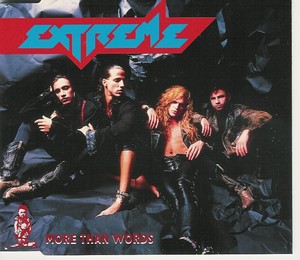
"More Than Words" is a song by American rock band Extreme. It is a ballad featuring acoustic guitar work by Nuno Bettencourt and the vocals of Gary Cherone. They both wrote the song, which was produced by Michael Wagener and represented a departure from the band's usual funk metal style. "More Than Words" was released as the third single from the band's second album, Pornograffitti (1990), on March 12, 1991 by A&M Records. It was a number one hit in the United States, where it was certified gold, as well as in Belgium, Canada, the Netherlands and New Zealand. The music video for the song was directed by Jonathan Dayton and Valerie Faris.

"Pour Some Sugar on Me" is a song by the English rock band Def Leppard from their 1987 album Hysteria. It reached number 2 on the US Billboard Hot 100 on 23 July 1988, behind "Hold On to the Nights" by Richard Marx. "Pour Some Sugar on Me" is considered the band's signature song, and was ranked #2 on VH1's "100 Greatest Songs of the 80s" in 2006.

"Is This Love" is a song by British rock band Whitesnake. It was released in 1987 as the second single from their self-titled album.

"I Remember You" is a song by American heavy metal band Skid Row. It was released in November 1989 as the third single from their eponymous debut album. Composed as a power ballad, it was written by bandmates Rachel Bolan and Dave "the Snake" Sabo. It reached number six on the US Billboard Hot 100 and number 23 on the Album Rock Tracks in early 1990. The song also charted at number two in New Zealand, number 12 in Ireland, number 14 in Canada, number 18 in Finland, and number 36 on the UK Singles Chart.
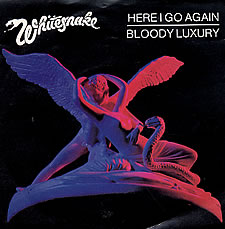
"Here I Go Again" is a song by British rock band Whitesnake. Originally released on their 1982 album, Saints & Sinners, the power ballad was re-recorded for their 1987 self-titled album. It was re-recorded again the same year in a new "radio-mix" version, which was released as a single and hit No. 1 on the Billboard Hot 100 chart on 10 October 1987, and also No. 9 on the UK Singles Chart on 28 November 1987. The 1987 version also made No. 1 on the Canadian RPM singles chart on 24 October 1987. In 2018 at the BMI London Awards, it received the "5 Million Performances Award", while in 2022 it garnered the "8 Million-Air Award".

"Silent Lucidity" is a power ballad by the band Queensrÿche from the 1990 album Empire. The song, which was composed by lead guitarist Chris DeGarmo, was the biggest hit for the band, peaking at #9 on the Billboard Hot 100 and at #1 on the Billboard Album Rock Tracks chart. "Silent Lucidity" was also nominated in 1992 for the Grammy Awards for Best Rock Song and Best Rock Vocal Performance by a Duo or Group.

"18 and Life" is a song by American heavy metal band Skid Row. It was released in June 1989 as the second single from their self-titled debut album. The power ballad is the band's biggest hit, reaching No. 4 on the US Billboard Hot 100 and No. 11 on the Billboard Album Rock Tracks chart. It was certified gold by the Recording Industry Association of America (RIAA) on September 13, 1989, when it sold 500,000 copies. The song also charted at No. 12 on the UK Singles Chart, No. 6 in Canada, and No. 5 in Ireland.
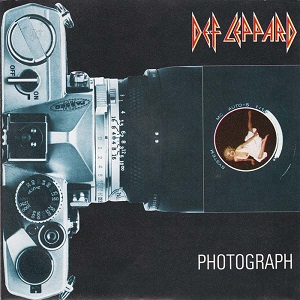
"Photograph" is a song by the English rock band Def Leppard and produced by Robert John "Mutt" Lange. It is the lead single from the band's third studio album, Pyromania (1983). Their lead vocalist Joe Elliott has described the song as generally about "something you can't ever get your hands on". When released as a single it reached No. 1 on the Billboard Top Tracks chart, where it stayed for six weeks, and No. 12 on the Pop Singles chart.
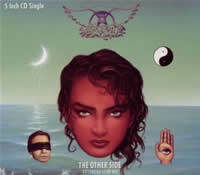
"The Other Side" is a song performed by the American rock band Aerosmith, and written by Steven Tyler, Jim Vallance, and Holland-Dozier-Holland. It was released on June 6, 1990 as the fourth single from the band's highly successful 1989 album Pump.
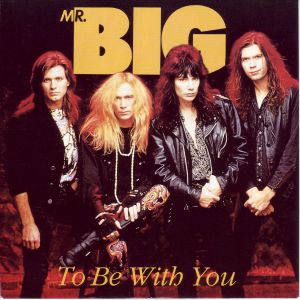
"To Be with You" is a song by American rock band Mr. Big, released in November 1991 as the second single from their second album, Lean into It (1991). The ballad reached number one on the US Billboard Hot 100 for three weeks and topped the charts in 11 other countries, including Australia, Canada, Germany, and New Zealand.

"When Love & Hate Collide" is a song by English rock band Def Leppard from their 1995 greatest hits album Vault, written by Joe Elliott and Rick Savage. The power ballad was originally written and demoed for Adrenalize, but not finalized until 1995 for its inclusion on Vault. The demo version is much more heavily produced in the signature style of Hysteria and Adrenalize, and the final version is more stripped down, supposedly toward the style of the following studio album Slang. The original demo version contains the final recorded guitar solo by late original guitarist Steve Clark.

Heaven is a power ballad by American glam metal band Warrant. It was released in July 1989, as the second single from Warrant's debut album Dirty Rotten Filthy Stinking Rich. The song is Warrant's most commercially successful single, spending two weeks at number two on the Billboard Hot 100, and number three on the Mainstream Rock Tracks chart. The track's commercial success has led it to becoming one of the best known songs by the band.

"Can't Get Enuff" is a single by American rock band Winger from their 1990 album In the Heart of the Young.

"Easy Come Easy Go" is a song by American rock band Winger from their second studio album, In the Heart of the Young. Released in 1990, the single charted at number 41. According to frontman Kip Winger, the song was a late addition to the track listing, written because it was felt that there were not enough rock songs on the album. "Can't Get Enuff" came about the same way.

"Two Steps Behind" is a song by English hard rock band Def Leppard from their 1993 compilation album Retro Active and the soundtrack to the film Last Action Hero. It reached number five on the US Billboard Album Rock Tracks chart, number 12 on the Billboard Hot 100, and number 32 on the UK Singles Chart. The music video was directed by Wayne Isham. In the 1993 Metal Edge Readers' Choice Awards, the song was voted "Song of the Year" and "Best Song from a Movie Soundtrack".
"When the Children Cry" is a power ballad performed by Danish-American glam metal band White Lion. It is the third single and closing track on their 1987 album, Pride. It peaked at number three on the US Billboard Hot 100, number two in Canada, and number 88 in the United Kingdom.

"Love of a Lifetime" is a song performed by the American rock band FireHouse. It was the band's third single and its highest-charting single in the United States, entering the Billboard Hot 100 June 29, 1991 at No. 81 and peaking at No. 5 the week of September 28, 1991. It is also the band's first and most popular power ballad. The song was written by vocalist C. J. Snare and guitarist Bill Leverty.

"Close My Eyes Forever" is a duet by Lita Ford and Ozzy Osbourne from Ford's 1988 album Lita. The song was written by Ford and Osbourne as the result of an accident in the studio, during which they both drank heavily and inadvertently wrote the lyrics to the song together. This song is Ford's highest charting single, peaking at number eight on the US Billboard Hot 100 chart in 1989 and also peaked at number 25 on the US Billboard Album Rock Tracks chart. It is also Osbourne's highest charting single of his solo career. "Close My Eyes Forever" was one of four singles from the album Lita.



















